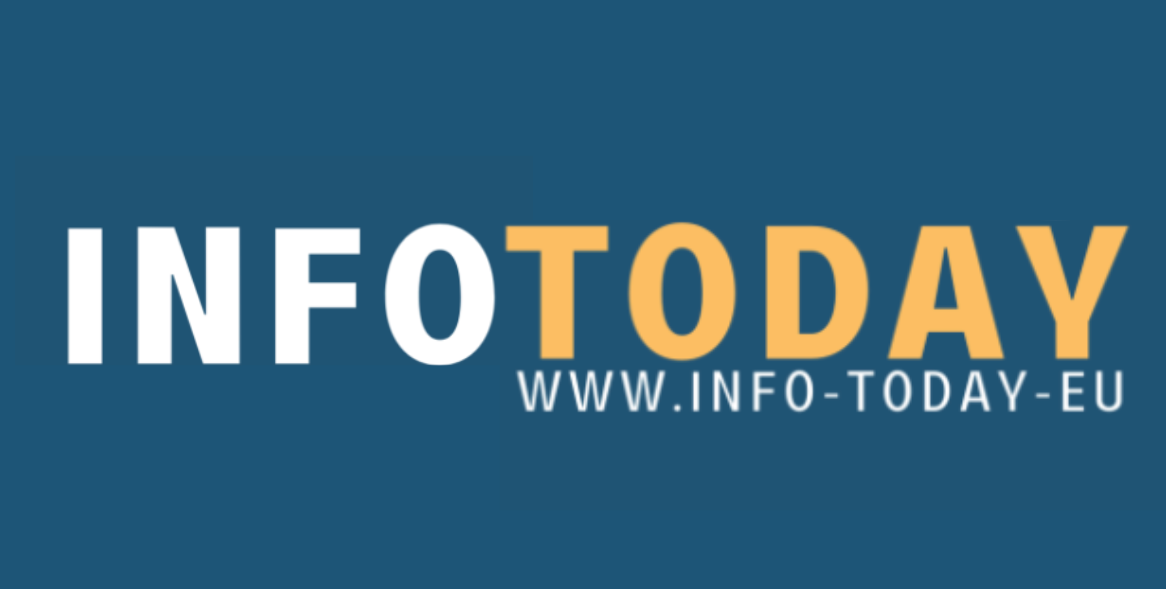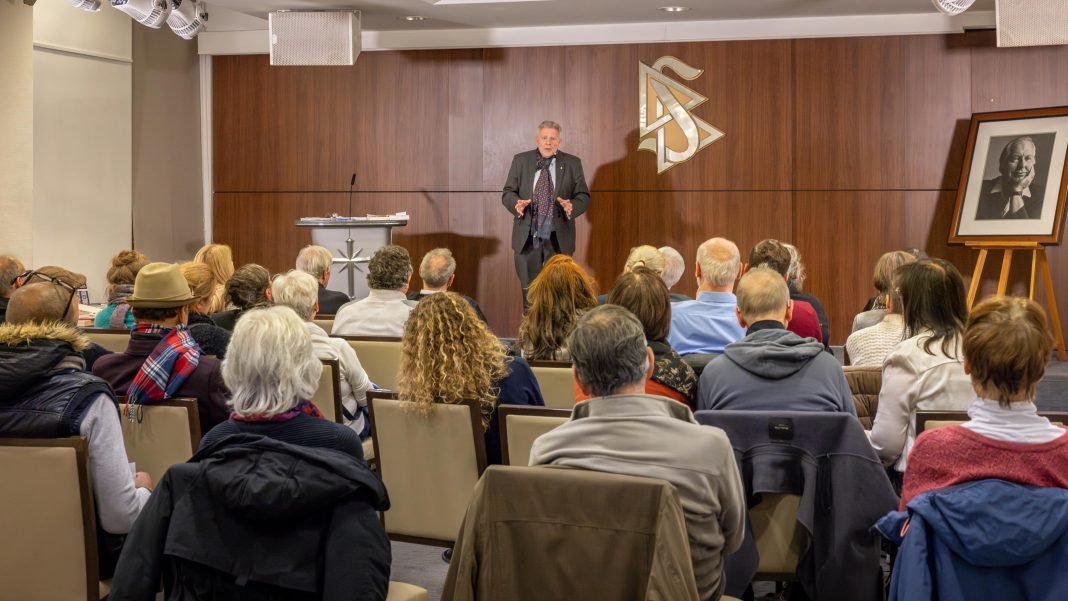The auditorium of the Church of Scientology’s European Office for Public Affairs and Human Rights was abuzz with activity as opinion leaders, academics, and the curious gathered for the inaugural event in a new series of philosophical and religious discussions. Organised by Ivan Arjona, President of the European Office of the Church of Scientology, the series aims to dispel myths surrounding different belief systems or schools of thought and to promote understanding and encourage dialogue between different world-views.
“This is the first in a series of conversations with leaders of different philosophies and religions,” explained Arjona in his opening speech. “Our aim is to explore their complexities, unravel their mysteries, and build bridges of understanding.”
The first session welcomed Philippe Liénard, writer, lawyer, former magistrate, lecturer, and recognised expert on Freemasonry. Known for his ability to reconcile historical rigour with an accessible narrative, Mr Liénard gave an enlightening presentation on the history, symbolism, and philosophy of Freemasonry while attacking the most widespread misconceptions about this tradition.
Freemasonry: a misunderstood tradition
Mr Liénard began by responding to the audience’s curiosity: “Freemasonry is not a secret society,” he declared. “It’s a discreet society with secrets—secrets that have to be lived. Freemasonry proposes that we go down into ourselves to find the inner wealth that we all possess, a bit like Socrates suggested, to get to know ourselves better and give birth to the best.”
Tracing its historical roots, Mr Liénard explained that Freemasonry officially came into being in 1717 with the creation of the Grand Lodge of London and Westminster. However, its origins are much older, rooted in ancient philosophical and symbolic traditions. He emphasised the universal appeal of Freemasonry, which transcends cultural and geographical boundaries: “It is a constantly evolving movement, shaped by the times and the people within it.”
Mr Liénard also refuted the myths linking Freemasonry to conspiracy theories. “Freemasonry is not about world domination,” he said. It is an invitation to self-improvement and to work for the progress of humanity and harmony between oneself and others, each at his or her own pace and with his or her own means.
The language of symbols
The use of symbolism is at the heart of Freemasonry, a subject that Liénard explored in depth. He explained that tools such as the compass and the square are not to be interpreted freely. The compass can symbolise the mind, whose openness is possible and desirable, and the square, matter. There are other possible interpretations.
Rituals also play an important role. “When you become a Freemason, you enter through a low, narrow door,” explains Liénard. “This symbolises birth and the beginning of a journey towards self-improvement.”
He pointed out that the symbols of Freemasonry are not unique to tradition but borrowed from more ancient civilisations. “The sun and moon, for example, are ancient symbols of duality and balance, which appeared in cultures long before the Romans. Freemasonry did not invent these symbols; it inherited them,” just as it inherited its philosophical ethos. He also explained that the triangle with an eye in its centre was not originally Masonic but Christian.
A tradition of inclusion and controversy
Mr Liénard emphasised the historical exclusion of women from Freemasonry as set out in the Anderson Constitutions of 1723, as well as the exclusion of disabled people and slaves. He also emphasised the existence in the USA of two Grand Lodges per State, one Caucasian, not to say white, and the other known as Prince Hall, bringing together ethnic minorities, including African-Americans.
However, he emphasised the development, particularly and above all in liberal Freemasonry, which, depending on the characteristics and choices of certain obediences and federations of lodges, allows work to be carried out by both men and women. This phenomenon can be seen in various countries, particularly France and Belgium. “Mixed lodges and lodges reserved for women play an active role in building the future of Freemasonry, as do those where there are only men,” he pointed out.
Freemasonry in the modern world
Mr Liénard believes that Freemasonry remains relevant in the 21st century. “Freemasonry is a place for dialogue and ethical exploration. It is a place where people can question, learn, and evolve without judgement.” According to Lienard, lodges allow people to exchange ideas freely, in complete equality and fraternity, respectfully, and without promoting liberticidal values.
He refuted the idea that Freemasonry is a tool for networking or social climbing. “Yes, there are individuals who use the fraternity for personal ends”, he admitted, “but the vast majority of Freemasons are honest, ordinary people looking to better themselves. No one intends to impose their ideas or point of view, or any revealed truth”.
To illustrate the ethical foundation of Freemasonry, Mr Liénard quoted the Marquis de Condorcet: “Truth belongs to those who seek it, not to those who claim to possess it. This is the very essence of Freemasonry: it is a personal journey for each individual”.
A space for questions and reflection
The audience was invited to ask questions, which led to a lively discussion. One of the participants asked about the relationship between Freemasonry and the ancient stonemasons, which prompted Mr Liénard to clarify: “Freemasonry is not the direct descendant of the medieval guilds,” he said. “Rather, it is a philosophical cousin, borrowing organisational structures and symbols but evolving into something different.”
Another participant asked how Freemasonry reconciles its traditions with modern values. “Freemasonry is a mirror of society”, replied Mr Liénard. “Freemasonry evolves with society. It is not static, it is dynamic.”
Closing remarks: Accepting differences
In his closing remarks, Mr Liénard invited the audience to accept diversity of thought and culture. He quoted Antoine de Saint-Exupéry: “If you differ from me, my brother, far from harming me, you enrich me. This is what Freemasonry conveys, without the slightest constraint. We must accept constructive differences and not fear them”.
Ivan Arjona concluded the evening by reflecting on the wider mission of the series. “Tonight’s conference has been the best start,” he said. “Through these discussions, we hope to foster greater understanding between people of different philosophies and religions. In doing so, we hope to create a world where dialogue replaces division.”
As well as being an exploration of Freemasonry, Philippe Liénard’s lecture was a call to curiosity, dialogue, and self-improvement. By unravelling the mysteries of this ancient tradition, he offered participants not only knowledge but also inspiration to seek their own truth and harmony in their own lives.
This event marks a good start to the Church of Scientology’s lecture series, setting a high standard for future discussions that promise to illuminate other philosophies and belief systems.


